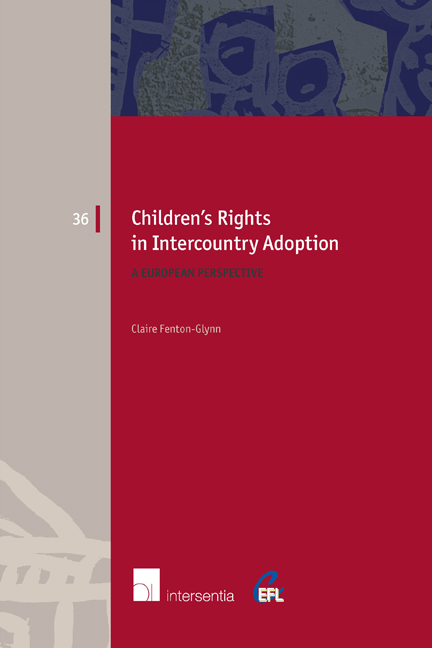Book contents
- Frontmatter
- Dedication
- Acknowledgements
- Contents
- Table of Cases
- Chapter 1 Introduction
- Chapter 2 Combating Abuses: International and Regional Regulation
- Chapter 3 Intercountry Adoption and the Domestic Child Welfare System: The Principle of Subsidiarity
- Chapter 4 Consenting Adults: Giving and Receiving Consent to Adoption
- Chapter 5 Buying Babies: The Inducement of Consent
- Chapter 6 Compulsory Adoption: Adoption Without Consent
- Chapter 7 Child Participation: Autonomy and Protection
- Chapter 8 Adoptive Parents: Eligibility, Preparation, and Support
- Chapter 9 Who Am I? The Child's Right to Identity
- Chapter 10 Conclusion
- List of Legislation
- Literature
- Index
- About the Author
- Miscellaneous Endmatter
Chapter 6 - Compulsory Adoption: Adoption Without Consent
Published online by Cambridge University Press: 26 November 2017
- Frontmatter
- Dedication
- Acknowledgements
- Contents
- Table of Cases
- Chapter 1 Introduction
- Chapter 2 Combating Abuses: International and Regional Regulation
- Chapter 3 Intercountry Adoption and the Domestic Child Welfare System: The Principle of Subsidiarity
- Chapter 4 Consenting Adults: Giving and Receiving Consent to Adoption
- Chapter 5 Buying Babies: The Inducement of Consent
- Chapter 6 Compulsory Adoption: Adoption Without Consent
- Chapter 7 Child Participation: Autonomy and Protection
- Chapter 8 Adoptive Parents: Eligibility, Preparation, and Support
- Chapter 9 Who Am I? The Child's Right to Identity
- Chapter 10 Conclusion
- List of Legislation
- Literature
- Index
- About the Author
- Miscellaneous Endmatter
Summary
While the previous chapters have discussed the mechanisms by which parents may give their consent to adoption, and the safeguards necessary to preserve the child's rights in this respect, this section will examine the circumstances in which parental consent can be overridden or dispensed with.
Nearly every country in Europe has a mechanism for dispensing with the need for parental consent or overriding a refusal to give consent in certain circumstances, with the sole exception of Italy, where the consent of parents is not needed for adoption in the first place. This is an extremely important area, particularly as it relates to parental “abandonment”, which is a common way in which many children pass into intercountry adoption. In addition, conditions for dispensing with consent display the potential conflict or confluence between parental rights and children's rights, manifesting the weight that authorities give to family autonomy and protection from state interference. On the other hand, it is a testing ground for tensions between different aspects of the child's rights in the adoption process, challenging the state to find the appropriate balance between maintaining family ties and ensuring a safe and stable environment for the child.
As discussed previously, the Hague Convention and UNCRC leave many issues regarding consent to the discretion of member states, giving little guidance as to who must give consent, and none at all concerning when this can be dispensed with, or on what grounds. Article 5(3) of the Revised European Convention on the Adoption of Children of 2008 provides somewhat more content to this area, requiring that consent only be overruled or dispensed with on “exceptional grounds”. No guidance is given as to what may constitute “exceptional grounds”, however, or the rights and interests to be taken into account when deciding these. As a result, it is not surprising that the mechanisms for dispensing with or overriding parental refusal to consent to adoption differ greatly between European states.
LOSS OF PARENTAL RIGHTS AND PARENTAL MISCONDUCT
The most common way in which consent is dispensed with is where the parents have been deprived of parental rights.
- Type
- Chapter
- Information
- Children's Rights in Intercountry AdoptionA European Perspective, pp. 105 - 116Publisher: IntersentiaPrint publication year: 2014

